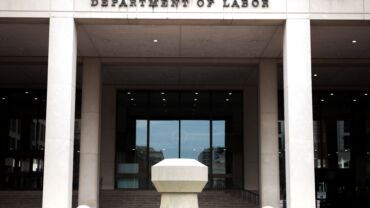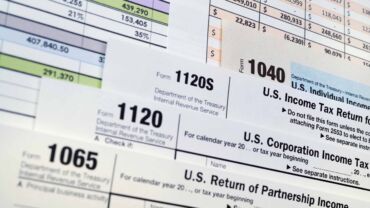A blog of some of the prior week’s more important payroll stories. This week’s focus is on: payroll in a pandemic, the status of President Biden’s $1.9 trillion COVID-19 relief bill, if a $15 per hour federal minimum wage will be part of Biden’s bill, IRS forms and publications, a court ruling on per diem for overtime calculations, E-Verify, the Labor Department’s apprenticeship program, the H-1B visa cap, and state and local news.
The first recorded use of the word “payroll” appeared around 1740 A.D. to describe the total amount of money paid to a business’s employees over a period of time. Over time, payroll has become much more than just paying wages to employees. It also has to do with a wide variety of topics such as reporting and paying taxes and keeping in compliance with laws. Benefits and pensions are payroll-related and some human-resource-related duties also involve payroll. It’s typically a business’s biggest expanse and keeping up with the many rules and changes is paramount to a business’s success.
Payroll in a Pandemic
In the past year-plus, payroll professionals have felt the pressures of this industry more acutely due to the COVID-19 pandemic. Federal legislation in the Families First Coronavirus Relief Act (FFCRA), Coronavirus Aid, Relief and Economic Security (CARES) Act and Consolidated Appropriations Act, 2021 (CCA, 2021) launched many changes to laws that affect a business’s payroll. After the laws, followed the guidance from the IRS and U.S. Department of Labor, among other agencies. Also, many states and localities enacted their own laws and voted on ordinances to help employers and workers navigate through this difficult time. Staying on top of these changes is a lot to keep up with.
Plus, with a new Presidential Administration in the White House, one can expect adjustments and new rules from federal agencies that may affect the payroll industry. President Biden has already taken some action with a regulatory freeze that affects payroll-related regulations like the DOL’s tipped employee (dual jobs and tip credit) and independent contractor (economic reality test) rules from the prior administration. The DOL recently proposed delaying the effective dates to these final regulations in response.
The year 2021, I believe, will be the year the tide turns on the pandemic and we really start to see a light at the end of the tunnel for a greater sense of normalcy. However, we’re not quite there yet. There is another COVID-19 relief bill from the Biden Administration that is expected to be signed into law, in one form or another, in the near future. That will result in more government agency guidance, updated and revised forms and publications, new compliance procedures, etc. Employers are still struggling to make payroll and employees are continuing to adjust to new ways of working and caring for themselves and their loved ones.
Payroll (in the full sense of the word) in a pandemic is very important. It’s security for employees when they see wages hit their bank account on payday. A sigh of relief when an employer knows it has qualified for a Paycheck Protection Program (PPP) loan and can pay its employees and keep the doors open for a few more weeks. The ability to focus on loved ones when an employee can take paid COVID-19 leave to care for a family member who is struggling with the effects of this virus. Or working to dig out of debt by utilizing COVID-19 tax credits available to employers.
Well-known comedian Jerry Seinfeld once joked that lawyers are the people who actually read the rules of the board game while most of the rest of us are, “throwing the dice, playing the game, moving our pieces around the board.” In this sense, payroll professionals are the lawyers of the payroll industry in that they have read the rules of the game and have the task to help employees understand their paycheck and keep employers in compliance with the laws.
At Thomson Reuters Checkpoint, we have payroll professionals (and lawyers) whose job it is to read the rules and report and create content that will help the community-at-large best understand them. We believe in our product and how it can benefit businesses – especially during these challenging times.
Now, let’s take a look at this past week in payroll and go over a few of the more interesting stories buzzing about in the industry of payroll.
Federal News
COVID-19 relief bill. On February 16, 2021, President Biden made his first official trip outside of Washington D.C. to Milwaukee, Wisconsin for a CNN town hall where he focused on his $1.9 trillion COVID-19 relief plan. The conclusion of former President Trump’s second Impeachment trial in the Senate has turned the focus back to the pandemic relief legislation that includes a proposal to increase emergency unemployment benefits from $300 to $400 per week and extend them into the fall of 2021. The House plans to vote on the relief plan on February 26, 2021.
$15 federal minimum wage. The plan also started with a $15 per hour federal minimum wage. On February 5, 2021, a Senate amendment to the bill was accepted that delays any minimum wage increase until after the COVID-19 emergency. And two Democrats in the Senate – Joe Manchin (D-WV) and Kyrsten Sinema (D-AZ) – have indicated they oppose such a federal minimum wage increase. Since the Senate is split at 50/50, the Democrats need every vote with Vice President Kamala Harris as the tie-breaker to tip the balance. However, that has not stopped House Democrats in the Committee on Education and Labor from moving forward with legislation that would increase the federal minimum wage to $15 per hour by 2025 and adding it to the larger House budget reconciliation bill. President Biden has already noted he does not think the proposal will make it into the final bill.
IRS forms and publications. In the IRS forms and publications arena, the Service has put out a final version of Publication 51, which is the agricultural employer’s tax guide, for tax year 2021. The updated version contains information on the COVID-19 tax credits for employers from the Families First Coronavirus Relief Act (FFCRA) and Coronavirus Aid, Relief and Economic Security (CARES) Act (i.e., paid sick and family leave tax credits and employee retention tax credit).
The IRS also put out a 2021 version of Form 8508 to request a waiver from filing certain information returns electronically. These returns include Forms W-2, the 1099 series and Form 8027 for reporting tips. The IRS will issue an approval or denial letter after evaluating the request.
Court rules on per diem overtime calculations. A federal appeals court in Clarke v. AMN Services LLC ruled that an employer improperly excluded per diem payments to traveling health care clinicians from overtime calculations. The company treated these per diems for the cost of meals, incidentals and housing as nontaxable income and excluded them from overtime calculations. The court said that the per diems were part of the clinicians’ pay package as compensation since they received them despite not traveling.
E-Verify record disposal. There is a E-Verify record disposal coming up on May 14, 2021 for records that are more than 10 years old. Employers using E-Verify have until that date to download information from the Historical Records Report if they want to retain the information.
Industry-recognized apprenticeship program removed. The Biden Administration has reversed a 2017 executive order from the prior administration that called for the U.S. Department of Labor (DOL) to start the industry-recognized apprenticeship program (IRAP), which aimed to give employers more flexibility on training workers without the registered apprenticeship process. The DOL announced the suspension of the program on February 17, 2021.
H-1B visa cap reached. The U.S. Citizenship and Immigration Services (USCIS) has announced that it has received enough petitions needed to reach the Congressionally-mandated 65,000 H-1B regular visa cap and the 20,000 H-1B visa U.S. advanced degree exemption (master’s cap) for fiscal year 2021. The H-1B visa is used by U.S. employers to hire foreign workers in areas of specialized knowledge or technical expertise, such as scientists, engineers or computer professionals.
State and Local News
Teleworking. Montana’s Department of Revenue has issued a reminder to explain that anyone who lived in Montana for any time in 2020 and worked their jobs remotely, including those who temporarily relocated due to the COVID-19 pandemic, must pay Montana state income tax on any wages received for work performed in the state, even if your job is normally based in another state. Several states have produced teleworking guidance since the COVID-19 pandemic resulted in many employees working from home in a state different from their typical work state.
Meal and rest break FAQs. The Oregon Bureau of Labor and Industries has updated its Meal and Rest Breaks FAQs. The FAQs note that while employers may require employees to stay on the premises during rest periods, if an employee is required to stay on the premises and on-call during that time, the employee has not been completely relieved of all duties.
Work search requirements waived. The Wisconsin Department of Workforce Development has a new emergency rule that continues to waive the work search requirements for people who apply for unemployment benefits during the COVID-19 emergency. Typically, state law requires claimants to look for a suitable job and provide information about four work search actions taken each week.
Unemployment tax calculations exclude COVID-19 claims. Recent Maryland legislation will exclude from unemployment tax rate calculations benefits claimed during the COVID-19 outbreak. House Bill 496 says to use July 1, 2019 as the computation date for the employer’s unemployment benefit ratio if using this date will result in a lower ratio and lower tax rate.
Minimum wage law amended regarding motor carriers. Arkansas legislation amends the state’s minimum wage law regarding liability relief for motor carriers. Specifically, a motor carrier employer is not subject to liability for failure to pay an employee minimum wage or overtime compensation for activities that occur while the employee is: (1) traveling to or from a personal residence, (2) engaging in a personal activity that is not primarily in furtherance of the employer’s business, or (3) logging time as “off-duty” or “sleeper berth.”
The Check is in the Mail
Though the most recent American football season ended a little more than two weeks ago, I am reminded of a quote from Art Rooney, founding owner of the Pittsburgh Steelers, who once said: “The biggest thrill wasn’t in winning Sunday, but in meeting the payroll Monday.” All businesses, including legendary franchises that have won six Super Bowls, must worry about payroll. Please consider reaching out to a knowledgeable salesperson at Thomson Reuters Checkpoint to learn more about how a payroll subscription can help your business.











